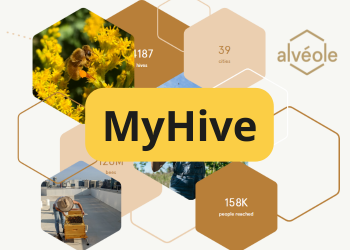
In collaboration with our beekeeping partner, Alvéole, we are excited to introduce our teaching beehive, located at the Eastside Branch. You'll be able to enjoy programs and workshops centered around teamwork, food production and environmental stewardship. The teaching beehive is sponsored by Iris & Monty Ward.
Advantages of Urban Beekeeping
Honey bees are just one of a number of pollinators like butterflies, bumble bees, and wild bees with whom we already share our urban space.
Urban beekeeping creates the opportunity to educate citizens about the environment, repurpose unused spaces within our cities, and produce hyper-local honey.
Bee Safety
Coexisting with bees in our environment is easy and natural, there are just a few best practices to keep in mind when working around a beehive.
Honey bees are very docile, focused mainly on bringing floral resources back to their colony. Bees are not aggressive, but they can be defensive, and it’s best to give the bees a bit of space to allow them to carry out their duties without interference.
Our hive has an entrance located at the front of the bottom box about six inches off the ground. You may notice bees congregating here in the summer months in an effort to cool off. It’s at this entrance that you’ll likely see bees entering and exiting the hive, carrying nectar or pollen, following their upward flight path.
We ask that you always stay 5 feet back from the hive entrance.
Honey Galore
Each year, the hive will produce 100 jars of local artisan honey! Flowers and other pollinator plants affect the taste and colour of the honey. Experience the sweetness of the wildflowers within Waterloo.
Honey produced from the hive will be used in programs and other library events.
Contact Us
Eastside Branch
519-886-1310 x410


